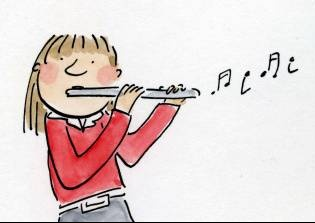“The flute of old Guillaume!” exclaimed Monsieur le Cure, leaping to his feet in amazement. “Aye, the flute of old Guillaume, and the music for the shepherds,” stammered the puzzled Francois. “But whence comes it? Who can play it thus?”
“那是老紀(jì)堯姆的長(zhǎng)笛!”屈爾先生驚奇地跳了起來(lái),喊道。“是啊,老紀(jì)堯姆的笛子,牧羊人的音樂(lè),”迷惑不解的弗朗索瓦斯結(jié)結(jié)巴巴地說(shuō)。“但它從何而來(lái)?誰(shuí)能這樣演奏呢?”
Monsieur le Cure did not stop to wonder. He went directly to the window, and looked out. There, with his back to the wall of the house, was Guillaume, playing bis very best.
屈爾先生沒(méi)有停下來(lái)思考。他徑直走到窗前向外望去。在那里,紀(jì)堯姆背靠著墻,他演奏得非常好。
“Guillaume/’ breathed Monsieur le Cure softly, “l(fā)ittle Guillaume.”
“紀(jì)堯姆/ '本堂先生輕聲地說(shuō),'小紀(jì)堯姆。”
At the sound all Guillaume’s bashfulness suddenly returned. The music ceased instantly, and he stood crestfallen and trernbling at his daring.
一聽(tīng)到這聲音,紀(jì)堯姆的羞恥心又突然恢復(fù)了。音樂(lè)立刻停止了,他垂頭喪氣地站在那里,為自己的大膽而發(fā)愣。
“Come in, little Guillaume,” invited Monsieur le Cure. “I would speak with thee.”
“進(jìn)來(lái),小紀(jì)堯姆,”屈爾先生邀請(qǐng)他。“我想和你談?wù)劇!?/div>
Guillaume obeyed.
紀(jì)堯姆進(jìn)去了。
“Thou hast given us the music for the shepherds well,” commended Monsieur le Cure, drawing the boy to him. “Canst thou not play for me, also, a noel or two?”
“你讓我們聽(tīng)到了牧羊的歌,”屈爾先生把小紀(jì)堯姆拉到他身邊稱(chēng)贊他。“你能為我彈奏一兩首嗎?”



